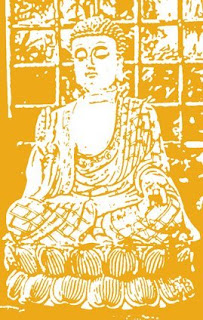 I've been playing with photoshop (I use the term play loosely), creating some new business cards, and a little ad sheet for the art tour. I am remembering how to transform and sharpen things, to work with layers (see there's Dharma in photoshop). This lovely little Buddha is simply a photo taken somewhere in our travels that I have altered a bit in photoshop and turned a lovely shade of orange.
I've been playing with photoshop (I use the term play loosely), creating some new business cards, and a little ad sheet for the art tour. I am remembering how to transform and sharpen things, to work with layers (see there's Dharma in photoshop). This lovely little Buddha is simply a photo taken somewhere in our travels that I have altered a bit in photoshop and turned a lovely shade of orange.This is the 99th Day of 100 Days of Dharma kids (remember that song, 99 bottles of beer on the wall?) What does that have to do with anything you ask? Well nothing really except that I think it's a human tendency to get a bit giddy as we near the finish line. Or maybe we put on the pressure. OMG it's the second last day I need to say something important, profound, sum it all up. Another human tendency too don't you think?
It's all about how we use our minds. Ask any athlete. When skill becomes fairly equal among athletes, it's the use of the mind that is one of the determining factors in successful outcomes. Doubt, fear, focus, determination, so many things are dependent on how we use our minds
So I guess if I were to start thinking about what aspects of the Dharma have been most important to me, the skillful use of the mind would be a big one. It covers so much ground. Right view or understanding is all about how we use our minds. Are we using faulty logic and coming to wrong conclusions about life. Instead of seeing life's difficulties as opportunities, do they make us feel bitter and cynical? And the mind can be a powerful perveyor of doubt and fear? Do we run with these stories and find ourselves down the rabbit hole or do we notice where we're going and decline Alice's invitation.
The mind is a powerful tool if we learn how to work with it. My friend the monk quotes her teacher as saying, "the mind makes a good servant but not a very good master". So while we use our minds, it is our hearts that provide direction (or our Buddha nature, or whatever you like to call it). I learn so much from watching my own mind, what it gets up to, the silly games it plays. And then I can remember (when I'm mindful) to have compassion for others because I know how hard it is to behave in ways that make sense.
Patience is another really important aspect of the Dharma for me. I am not particularly patient by nature. Like everyone else I have my ideas of how things should be and I want them to be that way yesterday. I want the no fuss, no muss version that they are always trying to sell me on TV. But as time goes on I learn that "patience is the reward of patience" (this quote is attributed to St. Augustine). Sitting teaches me patience. And observing life from the perspective of the Dharma teaches me patience. I have learned to see that things arrive in their own good time, not when I want them to. This has been a really valuable lesson for me. It's not on my timelines (whatever IT is). I understand things after 100 times of getting it wrong, if that's what it takes. There's not a lot that I can "make" happen. I can do my part and then let the rest go, because ultimately, I have learned a bigger picture is playing itself out. Of course I don't always remember this on the spot, but eventually with some patience I get to that place.
And learning to listen to the "still, small voice within" that has been an important and mysterious part of the Dharma for me. Learning "how" to do that .... it's not always easy but as time goes on I see that it is the only way to really arrive at a decision about anything important. Call it your intuition, your sixth sense, or listening to your heart, somehow we all have that wisdom inside us that ultimately knows the truth, the right action. We just have to learn how to access it and not second guess ourselves. It takes practice and faith....
And there is another important aspect of the Dharma, faith. In an early blog I think I mentioned that in my 20's I was very clear that I had no concept of faith. Faith meant believing something without logical cause and that didn't make any sense to me, at least on a thinking level. I'm sure I made intuitive decisions. I just didn't think of them as being based on faith. To me faith and trust now mean believing that this is a friendly universe we live in, though sometimes it might not seem that way. To have faith means that when things happen that I would not choose, I now believe that something larger is working itself out, that I don't necessarily need to know or figureout. I have faith that truth triumphs over evil every time.
And mostly I feel grateful just to have found the Dharma, to be fortunate enough to have heard the teachings and have the time to spend learning and practicing and contemplating it. This is my great good fortune. I wish you much good fortune.


No comments:
Post a Comment